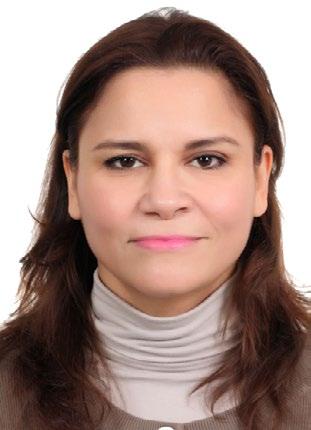
3 minute read
Radia Sedaoui

Chief, Energy Section, Sustainable Development Policies Division, UNESCWA (UN)
Advertisement
HOW ARE YOU CREATING A SUSTAINABLE FUTURE?
The essence of sustainable development is to leave more of our planet than we are taking. Future generations symbolize the intrinsic value of our planet as finite system, not just as source of infinite growth and resources This is my inspiration to support creating sustainable future.
Energy is an essential enabling factor for sustainable development, including poverty eradication, water and food security, advances in health and education, gender equity and female empowerment, decent work opportunities and sustainable economic growth, innovation, climate actions and the principle of “leaving no one behind”. Thus, creating a sustainble future as an energy expert is important for me personally, since I came from a region, the arab region, which is one of the most vulnerable regions in the world in terms of water scarcity, land degradation and desertification and high reliance on fossil Fuels both as a source of supply and consumption.
Since I came cross the Sustainable Energy For All initiative (SEforALL) launched by Mr. Bankimon in 2011, I decided to join the United Nations system to contribute to creating a sustainable future by leveraging on my expertise in the field of energy to promote dialogue and knowledge sharing and to foster interregional cooperation and partnerships. To that end, I stive to support Arab countries in mainstreaming sustainable energy in national development plans, identifying priorities and actions through an integrated approach for enabling the SDGs. Moreover, I am working on building the capacity of member states in formulating sustainable energy policies and addressing vulnerabilities, especially in diversifying the energy mix, improving the efficiency of it use, identifying new renewable energy uses, advising technologies that apply the principles of the circular economy, and integrating them in nationally determined contributions. I also conducted resource mobilisation and designed projects proposals to support the most vulnerable communities, among them implementing small scale renewable energy applications in rural areas with special focus on rural women and young people based on a business model of know-how rather than the usual business model based on handout.
WHAT ARE THE BIGGEST CHALLENGES YOU FACE AT THE UN IN CREATING A SUSTAINABLE FUTURE?
There are several national, regional and global factors that pose challenges for me to accomplish my mission and thus achieve the expected results and more importantly to make the greatest impact especially for the most vulnerable countries and communities. Indeed, the ongoing global and regional conflicts and instability, coupled with fast changing governments and governing structures in my region create high levels of uncertainty that challenge my ability to support in devising long term-plans and strategies on a national and regional level, as well as in enhancing regional cooperation.
Other challenges I face, and which might well be the biggest challenge in the course of sustainable development is how to address the trade-off between the interests of current and future generations from the angle of energy and natural resources which are intimately linked to our current lifestyles and our patterns for the production and consumption.
Although working for the UN system presents an opportunity to support the “left behind” but it does not present adequate agility to operate in this very dynamic and fragile environment such as implementing energy projects in the field.
HOW ARE YOU OVERCOMING SAID? CHALLENGES?
I always work by adopting an agile approach for responding to the fluid and ever-changing landscape in the Arab region, not least to regional and global shocks. I rely on building trust with different stakeholders and leveraging on my personal network to support in implementing my work plan. To that end, I try to ensure continues communication with member countries and their related institutions including universities, research centres and independent experts to support efficiently member states in assessing progress made on SDG 7 and in other related goals, especially in Arab least developed and conflict-affected countries to identify regional priorities and actions. I remain also committed to studying priority areas within the energy transition to support the Arab region maximise on the use of local energy resources and establish safe and fair mechanisms for a just and inclusive energy transition by applying an integrated approach for which Energy is the Enabler to support accelerating progress in achieving the 2030 Agenda for Sustainable development.
WHAT’S ONE THING WE’RE NOT SPEAKING ABOUT IN SUSTAINABILITY THAT WE SHOULD BE?
Personally, I think the 2030 agenda for sustainable development and its 17 SDGs already cover the full concept of sustainability including the integrated approach in achieving the SDGs. The agenda does have its limitation in terms of lack of interlinked indicators that could help to assess and enhance synergies and address trades-off in achieving the SDGs, but this was left to each country national context. I believe that sustainable development rests on a political process that includes, listens to, and responds to different interests, groups, and opinions, and gives them weight in political decisions. The transformation required in energy and other sectors, or the failure to act, will affect everyone on our planet, and it will do so in different ways. Thus, in my views we do speak about full concept of sustainability, but we are still not humble enough to accept that only by enhancing collaboration we can face any kind of crisis such as pandemics and the climate change crisis and enable the achievement of the SDGs for which all countries are lagging behind.










